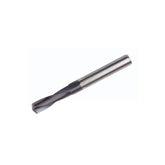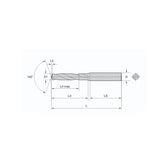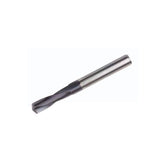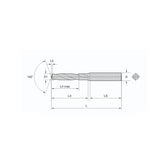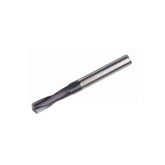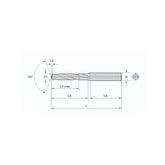Carbide Drill Bit Selection Guide
Carbide Drill Bit Buying Guide
In industries where precision and durability matter, your drill bit is just as crucial as the drill itself. High-quality carbide drill bits deliver superior performance across countless applications. This comprehensive guide will help you make informed decisions when selecting carbide bits for your projects.
1. Understanding Carbide Drill Bits
"Carbide" refers to the ultra-hard material composition of these bits. Unlike standard high-speed steel (HSS) bits commonly used for DIY projects, carbide bits are engineered for industrial applications where strength and precision are paramount.
Carbide drill bits feature a unique structure designed for drilling through extremely hard materials. They operate through a rapid stamping action (imperceptible to the naked eye) that crumbles material while efficiently expelling debris from the hole.
2. Carbide Drill Bit Structure
Carbide bits are immediately recognizable by their specialized design. Key structural elements include:
Reinforced Tip
Ultra-hard carbide tip designed to penetrate the toughest materials without deformation
Coolant Channels
Specialized grooves to dissipate heat during high-speed drilling operations
Helical Flutes
Spiral grooves that efficiently remove debris from the drilling area
Precision Ground
Laser-measured specifications for consistent diameter and cutting angles
Available in virtually any size (from micro-bits for electronics to industrial-scale 60" bits), carbide bits can be custom-manufactured to meet specialized requirements.
3. Common Types of Carbide Drill Bits
Twist Bits
The most versatile and widely recognized bit type. Features spiral grooves along the body to efficiently expel debris. Ideal for drilling small to medium holes in various materials.
Spade Bits & Hole Saws
Designed for larger diameter holes. Spade bits have wing-like flukes with a central point, while hole saws feature a hollow core that collects the removed material.
Step Bits
Feature a tiered, stepped design that allows drilling multiple hole sizes without changing bits. Perfect for creating precise, clean holes in thin materials.
4. Applications & Industry Uses
Carbide drill bits excel in demanding applications across numerous industries:
- PCB Manufacturing: Micro-bits drill precise holes in circuit boards
- Oil & Gas Industry: Penetrate the Earth's hardest geological formations
- Masonry & Construction: Drill through concrete, brick, and stone
- Aerospace Engineering: Machine high-strength alloys and composites
- Automotive Manufacturing: Drill hardened engine components
- Woodworking: Create clean holes in dense hardwoods and laminates
5. Material Comparison
| Material | Best For | Durability | Heat Resistance | Cost Efficiency |
|---|---|---|---|---|
| Carbide | Hard materials, precision work | Excellent | Superior | High (long-term) |
| High-Speed Steel (HSS) | Wood, soft metals | Good | Moderate | Medium |
| Cobalt | Stainless steel, hard metals | Very Good | Good | Medium-High |
| Titanium Coated | General purpose | Good | Moderate | Low-Medium |
6. Benefits of Carbide Drill Bits
Unmatched Strength
Carbide's tungsten-carbon composition creates one of the hardest materials available, capable of drilling through steel and other challenging surfaces.
Exceptional Precision
Can be crafted to microscopic tolerances for applications requiring extreme accuracy.
Long-Term Durability
Resists bending and wear even with prolonged use. Can be sharpened multiple times to extend lifespan.
Versatile Applications
Performs equally well across industries from construction to aerospace to electronics manufacturing.
Eco-Friendly
Often made from recycled materials and can be repurposed at end-of-life, reducing environmental impact.
High-Speed Performance
Maintains cutting edge integrity at temperatures that would degrade other bit materials.
7. Professional Buying Tips
Match Bit to Application
Consider your specific project requirements. For large diameter holes in wood, choose spade bits. For metalworking, select twist bits with 135° split points. For thin materials, step bits provide the cleanest holes.
Size & Shank Compatibility
Standard drills accommodate bits from 1mm to 13mm. Industrial drills handle up to 25mm or larger. Always verify shank compatibility - common types include round, hex, and SDS.
Special Features
For deep drilling, consider extended length bits. For hard materials, look for bits with coolant channels. For production environments, invest in coated carbide bits for extended tool life.
Quality Indicators
Inspect for consistent grind patterns, smooth flutes, and sharp cutting edges. Premium carbide bits often feature micro-grain carbide construction and specialized coatings.
Ready to Upgrade Your Tool Collection?
Explore our premium selection of carbide drill bits designed for professionals who demand precision and durability.
Shop Carbide Drill Bits Now